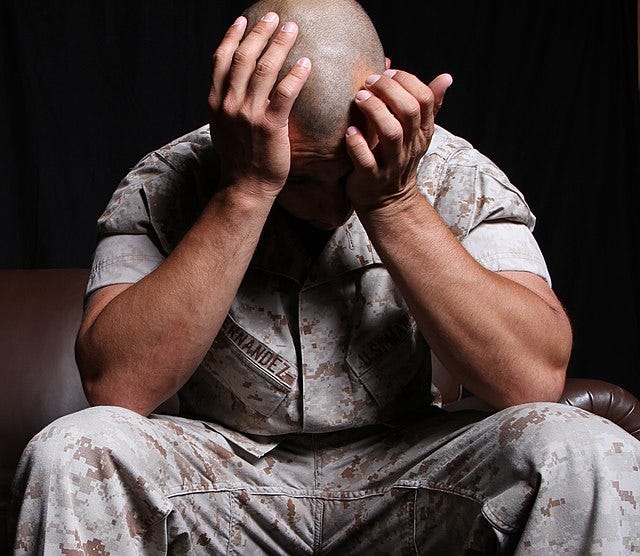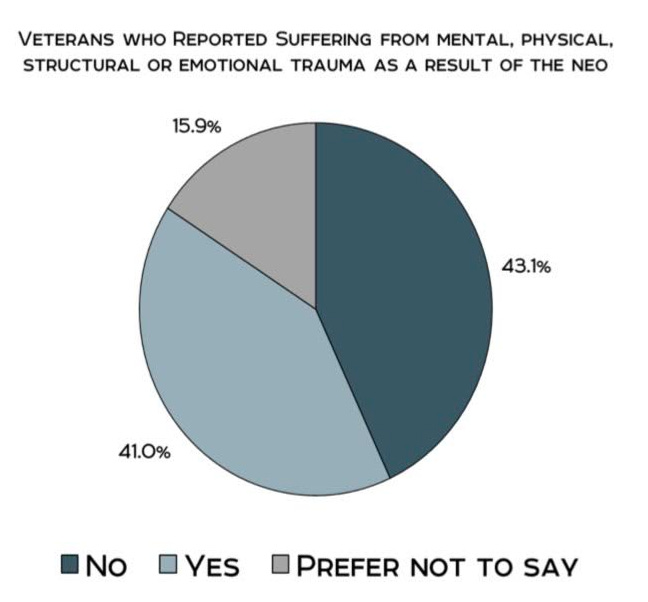
In case my friendship with Will wasn’t a clear indication, I genuinely enjoy collaborating with those who possess opinions different from my own (remember, folks: dissent, with respect). Often, these collaborations both expand and refine my thinking around difficult or controversial topics and deepen my ability to understand opposing points of view.
This was never more true than during my recent interview with Rev. Dr. Michael Yandell on Shoulder to Shoulder, where we discussed the definition of moral injury and whether this type of harm is better addressed under a humanities or clinical model. (You can watch the episode on YouTube here, or listen to it on Apple or Spotify using the links attached.) In simpler terms, we wanted to determine which professional field best addresses moral injury in veterans.
A few weeks prior to his episode, Will and I had a call with Michael, during which we introduced ourselves, our little fledgling organization, and our concept for his segment. As he spoke, it became apparent that Michael felt that a humanities-based model best addresses moral injury. Not wanting him to feel deceived into participating in our podcast, I clarified that Will and I believe a clinical (treatment) approach better serves moral injury.
My perspective was directly influenced by my experience working with veterans’ disability claims. When I first entered the field in 2015, I was shocked by the number of Vietnam veterans who were just now seeking benefits for service-related posttraumatic stress disorder (PTSD). The war had ended in 1975, and yet I was seeing countless first-time claims for the mental injuries incurred some 50 years prior.
I believe, in part, that we have Global War on Terror (GWoT) veterans to thank for this. They represent a new era of servicemembers who don’t shy away from the topic of PTSD. They are unafraid to talk about the ways in which military service can result in mental trauma and to demand accountability for the harms incurred. Truly, we have them to thank for bringing PTSD to the forefront of our national consciousness.
As Vietnam veterans became more exposed to the concept of PTSD and the ways in which it can manifest, we saw this sort of mass awakening within their community. Suddenly, these veterans could put a name to their own suffering. They began to understand that they weren’t inherently bad or broken people; they were victims of their own military experience, burdened with the long-term consequences of such. And under the example set by their GWoT peers, these veterans finally gave themselves permission to acknowledge the harm and seek help.
Now, am I thrilled that it took so long for Vietnam veterans to understand their own injuries and embrace their right to meaningful support? No, of course not. I’ve read way too many narratives about the myriad of ways in which PTSD can destroy you (and those you love) to look too favorably upon that delay. But I’m also grateful that our veterans were able to get there at all.
This is why I now advocate for moral injury to be included in the Diagnostic and Statistical Manual of Mental Disorders (DSM), the premier professional reference for formal mental health conditions. I want veterans to be seen AND understood. I want them to feel validated in their suffering and empowered to seek meaningful support without fear of judgment or reprisal. And I want them to feel safe in seeking support from treatment providers who truly believe that moral injury exists and seek to address its many facets. In other words, I want moral injury to be addressed under a clinical model.
Michael listened patiently as I laid out my argument and then said something that stopped me dead in my tracks: “I recoil from thinking of [moral injury] as a ‘disorder’ because, to me, it is a sign of [moral] health . . . to see moral calamity and [horror and] despair at not being able to change it . . . like, don't you get it? Don't you get how wrong this entire [war] was? . . . How dare you say I have a disorder when this whole thing has been a travesty and injustice.”
Oof.
He was right.
When we classify something as a “disorder,” we imply that there is something wrong with the person who bears it. But moral injury is the sign of an operational moral compass and the willingness to confront that—for at least one moment in time—you did not find yourself pointing towards your own true north. There is nothing “wrong” about that.
Aside from the necessary validation that those who suffer from moral injury do so not because they are flawed but because they are well—this way of thinking also promotes a more reasonable chance at healing. In a really beautiful essay about his experience with moral injury (first published in 2016 and again in 2021, and which I encourage everyone to read), Michael cites Iris Murdoch, who says that when we are suffering, “we console ourselves with fantasies of ‘bouncing back’.” And yet, per Michael, “Veterans cannot ‘unhappen’ events. That is a fantasy in which we must not indulge.” Instead, we must help veterans to confront the ways in which their values were betrayed and to rectify that with the people they’d hoped to be: “Before the war, I thought of myself as good, as someone capable of choosing goodness. I recognize now that I am not good and that I have never been good in the way I once used to imagine . . . Rather than returning to some glorified past, I must come to terms with who I am and then must look toward becoming something new.”

So, where did we land after our conversation? On a unified front. Moral injury is complex and nuanced, worthy of a strategy that addresses all the ways in which it harms our bodies, minds, and souls. As Michael says in his article above, “[v]eterans must continue to try to articulate the void of moral injury. Their neighbors must continue to try to see it, to hear it, and to come to terms with it. There must be people and institutions capable of bearing that responsibility in order to open pathways of hope.”
Because until we can acknowledge moral injury for the beast it truly is, we hold no hope of conquering it. And isn’t that what truly matters?
(If you’re interested, Michael also wrote an excellent book titled War and Negative Revelation: A Theoretical Reflection on Moral Injury, which can be purchased here.)




Thank you Kate for this thoughtful essay on moral injury. I really appreciate how you and Will are not afraid to tackle difficult topics even when your opinion differs. I love how active listening, like you described in this article between yourself and Michael, opened the door to a respectful understanding and hope!
I really appreciate Michael’s perspective of how when one experiences moral injury, it’s an indication of health rather than a disorder. Personally, I feel the same way about PTSD. I will never forget my professor in grad school (waaay back in the last century!) when PTSD had recently been added to the DSM) putting PTSO on the board and explaining that when you consider trauma, it seems more reasonable to look at the symptoms as in fact an “orderly” response to such events! It’s people who have no disturbing symptoms following trauma that indicate “disorder”. Therefore, I prefer calling it PTSI referring to it as an injury that can and does heal (with treatment of course) and therein lies the need for it to be listed in the DSM for our medical/healthcare systems like the VA to serve our warfighters who suffer from the symptoms.
Thank you again for your thoughtful and articulate articles on important but very challenging issues!
All my best to you and Will! I love you guys!
I don't think a clinical model for moral injury is inappropriate.
It's one thing to bring yourself to medical care after a lifetime of self-neglect, and it's another thing to bring a healthy body to medical care after it has undergone trauma.
I myself had a very severe trauma as a child that led to depression, anxiety, and multiple personality disorder. I have spent decades in recovery— I would not in any way characterize it as “bouncing back,” but after decades of wrestling with symptom after symptom and roadblock after roadblock, I am healthier than I have been since I was two years old.
Also, in your essay you speak about one kind of moral injury in which a person does not live up to their ideals. Does this include witnessing other people doing actions that you cannot control rather than committing deeds about which you are ashamed?
How about a multidisciplinary approach? Clinical, humanities, spiritual?